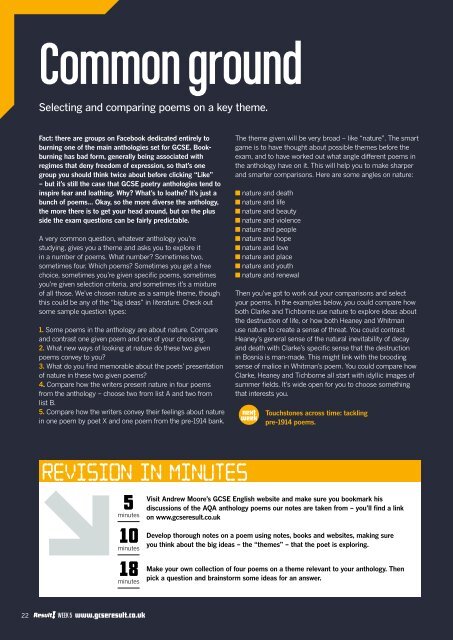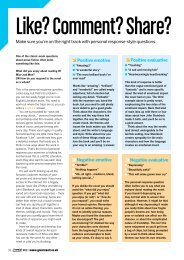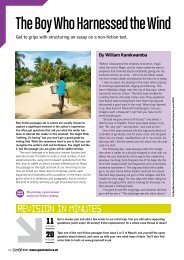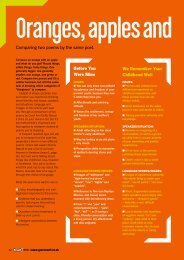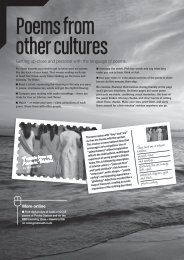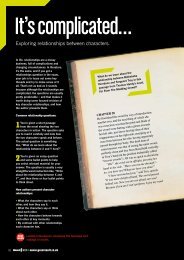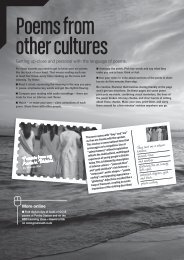Revision in minutes - GCSE English Revision - Result! magazine
Revision in minutes - GCSE English Revision - Result! magazine
Revision in minutes - GCSE English Revision - Result! magazine
Create successful ePaper yourself
Turn your PDF publications into a flip-book with our unique Google optimized e-Paper software.
Common ground<br />
Select<strong>in</strong>g and compar<strong>in</strong>g poems on a key theme.<br />
Fact: there are groups on Facebook dedicated entirely to<br />
burn<strong>in</strong>g one of the ma<strong>in</strong> anthologies set for <strong>GCSE</strong>. Bookburn<strong>in</strong>g<br />
has bad form, generally be<strong>in</strong>g associated with<br />
regimes that deny freedom of expression, so that’s one<br />
group you should th<strong>in</strong>k twice about before click<strong>in</strong>g “Like”<br />
– but it’s still the case that <strong>GCSE</strong> poetry anthologies tend to<br />
<strong>in</strong>spire fear and loath<strong>in</strong>g. Why What’s to loathe It’s just a<br />
bunch of poems… Okay, so the more diverse the anthology,<br />
the more there is to get your head around, but on the plus<br />
side the exam questions can be fairly predictable.<br />
A very common question, whatever anthology you’re<br />
study<strong>in</strong>g, gives you a theme and asks you to explore it<br />
<strong>in</strong> a number of poems. What number Sometimes two,<br />
sometimes four. Which poems Sometimes you get a free<br />
choice, sometimes you’re given specific poems, sometimes<br />
you’re given selection criteria, and sometimes it’s a mixture<br />
of all those. We’ve chosen nature as a sample theme, though<br />
this could be any of the “big ideas” <strong>in</strong> literature. Check out<br />
some sample question types:<br />
1. Some poems <strong>in</strong> the anthology are about nature. Compare<br />
and contrast one given poem and one of your choos<strong>in</strong>g.<br />
2. What new ways of look<strong>in</strong>g at nature do these two given<br />
poems convey to you<br />
3. What do you f<strong>in</strong>d memorable about the poets’ presentation<br />
of nature <strong>in</strong> these two given poems<br />
4. Compare how the writers present nature <strong>in</strong> four poems<br />
from the anthology – choose two from list A and two from<br />
list B.<br />
5. Compare how the writers convey their feel<strong>in</strong>gs about nature<br />
<strong>in</strong> one poem by poet X and one poem from the pre-1914 bank.<br />
The theme given will be very broad – like “nature”. The smart<br />
game is to have thought about possible themes before the<br />
exam, and to have worked out what angle different poems <strong>in</strong><br />
the anthology have on it. This will help you to make sharper<br />
and smarter comparisons. Here are some angles on nature:<br />
■ nature and death<br />
■ nature and life<br />
■ nature and beauty<br />
■ nature and violence<br />
■ nature and people<br />
■ nature and hope<br />
■ nature and love<br />
■ nature and place<br />
■ nature and youth<br />
■ nature and renewal<br />
Then you’ve got to work out your comparisons and select<br />
your poems. In the examples below, you could compare how<br />
both Clarke and Tichborne use nature to explore ideas about<br />
the destruction of life, or how both Heaney and Whitman<br />
use nature to create a sense of threat. You could contrast<br />
Heaney’s general sense of the natural <strong>in</strong>evitability of decay<br />
and death with Clarke’s specific sense that the destruction<br />
<strong>in</strong> Bosnia is man-made. This might l<strong>in</strong>k with the brood<strong>in</strong>g<br />
sense of malice <strong>in</strong> Whitman’s poem. You could compare how<br />
Clarke, Heaney and Tichborne all start with idyllic images of<br />
summer fields. It’s wide open for you to choose someth<strong>in</strong>g<br />
that <strong>in</strong>terests you.<br />
●<br />
next<br />
week<br />
Touchstones across time: tackl<strong>in</strong>g<br />
pre-1914 poems.<br />
<strong>Revision</strong> <strong>in</strong> m<strong>in</strong>utes<br />
5<br />
<br />
10<br />
<br />
18<br />
<br />
Visit Andrew Moore’s <strong>GCSE</strong> <strong>English</strong> website and make sure you bookmark his<br />
discussions of the AQA anthology poems our notes are taken from – you’ll f<strong>in</strong>d a l<strong>in</strong>k<br />
on www.gcseresult.co.uk<br />
Develop thorough notes on a poem us<strong>in</strong>g notes, books and websites, mak<strong>in</strong>g sure<br />
you th<strong>in</strong>k about the big ideas – the “themes” – that the poet is explor<strong>in</strong>g.<br />
Make your own collection of four poems on a theme relevant to your anthology. Then<br />
pick a question and bra<strong>in</strong>storm some ideas for an answer.<br />
WEEK 5 www.gcseresult.co.uk
COMPARING POEMS<br />
Poetry<br />
<br />
Blackberry Pick<strong>in</strong>g<br />
By Seamus Heaney, 1966<br />
This poem gives a vivid<br />
account of pick<strong>in</strong>g<br />
blackberries, but it is<br />
really about hope and<br />
disappo<strong>in</strong>tment (and how<br />
th<strong>in</strong>gs never quite live up to<br />
our expectations). Heaney<br />
suggests that what is true of<br />
blackberries may be true of<br />
good th<strong>in</strong>gs generally.<br />
I always felt like cry<strong>in</strong>g. It<br />
wasn’t fair<br />
That all the lovely canfuls<br />
smelt of rot.<br />
Each year I hoped they’d<br />
keep, knew they would not.<br />
The Field Mouse<br />
By Gillian Clarke, 1998<br />
This piece recalls Robert<br />
Burns’s famous poem To a<br />
Mouse, on turn<strong>in</strong>g up her<br />
nest with the plough. In<br />
both poems the mouse is<br />
powerless aga<strong>in</strong>st man’s<br />
<strong>in</strong>terference. In each poem<br />
the mouse is a symbol of<br />
weak or vulnerable people,<br />
threatened by forces beyond<br />
their control.<br />
All night I dream the children<br />
dance <strong>in</strong> grass<br />
their bones brittle as mouseribs,<br />
the air<br />
stammer<strong>in</strong>g with gunfire, my<br />
neighbour turned<br />
stranger, wound<strong>in</strong>g my land<br />
with stones.<br />
Patroll<strong>in</strong>g Barnegat<br />
By Walt Whitman, 1880<br />
The poem is almost a list of<br />
details, each l<strong>in</strong>e end<strong>in</strong>g with<br />
a verb. Mostly these suggest<br />
strong physical action or<br />
vivid details. It is not clear<br />
whether the “dim, weird<br />
forms” are natural features,<br />
ships or people – but there<br />
is a clear sense of nature<br />
as massively powerful,<br />
threaten<strong>in</strong>g man’s precarious<br />
existence.<br />
Wild, wild the storm, and the<br />
sea high runn<strong>in</strong>g<br />
Steady the roar of the gale,<br />
with <strong>in</strong>cessant undertone<br />
mutter<strong>in</strong>g,<br />
Shouts of demoniac laughter<br />
fitfully pierc<strong>in</strong>g and peal<strong>in</strong>g,<br />
Waves, air, midnight, their<br />
savagest tr<strong>in</strong>ity lash<strong>in</strong>g,<br />
Tichborne’s Elegy<br />
By Chidiock Tichborne,<br />
1586<br />
The is a reflection on the<br />
writer’s life and a lament for<br />
his misfortune. It proceeds<br />
by a series of statements <strong>in</strong><br />
which the first half somehow<br />
contradicts or contrasts with<br />
the second half. In each case<br />
someth<strong>in</strong>g that began as, or<br />
should be, good becomes<br />
bad – lead<strong>in</strong>g to the paradox<br />
of the f<strong>in</strong>al l<strong>in</strong>e, “And now I<br />
live, and now my life is done”<br />
<strong>in</strong> which Tichborne notes<br />
that he is still alive but his<br />
life is really over.<br />
My prime of youth is but a<br />
frost of cares,<br />
My feast of joy is but a dish<br />
of pa<strong>in</strong>,<br />
My crop of corn is but a field<br />
of tares,<br />
And all my good is but va<strong>in</strong><br />
hope of ga<strong>in</strong>;<br />
www.gcseresult.co.uk<br />
WEEK 5


